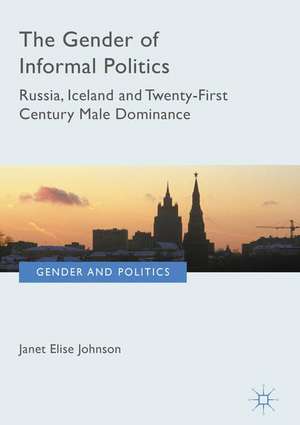The Gender of Informal Politics: Russia, Iceland and Twenty-First Century Male Dominance: Gender and Politics
Autor Janet Elise Johnsonen Limba Engleză Hardback – 22 sep 2017
| Toate formatele și edițiile | Preț | Express |
|---|---|---|
| Paperback (1) | 574.59 lei 38-44 zile | |
| Springer International Publishing – 11 aug 2018 | 574.59 lei 38-44 zile | |
| Hardback (1) | 639.90 lei 6-8 săpt. | |
| Springer International Publishing – 22 sep 2017 | 639.90 lei 6-8 săpt. |
Din seria Gender and Politics
- 20%
 Preț: 690.22 lei
Preț: 690.22 lei - 20%
 Preț: 691.13 lei
Preț: 691.13 lei -
 Preț: 172.47 lei
Preț: 172.47 lei - 18%
 Preț: 788.90 lei
Preț: 788.90 lei -
 Preț: 392.60 lei
Preț: 392.60 lei - 18%
 Preț: 947.04 lei
Preț: 947.04 lei - 27%
 Preț: 359.33 lei
Preț: 359.33 lei - 18%
 Preț: 2117.61 lei
Preț: 2117.61 lei -
 Preț: 396.02 lei
Preț: 396.02 lei - 15%
 Preț: 530.10 lei
Preț: 530.10 lei - 15%
 Preț: 641.71 lei
Preț: 641.71 lei -
 Preț: 383.71 lei
Preț: 383.71 lei -
 Preț: 390.63 lei
Preț: 390.63 lei -
 Preț: 386.00 lei
Preț: 386.00 lei - 9%
 Preț: 254.97 lei
Preț: 254.97 lei -
 Preț: 389.70 lei
Preț: 389.70 lei - 18%
 Preț: 1111.22 lei
Preț: 1111.22 lei -
 Preț: 382.95 lei
Preț: 382.95 lei - 22%
 Preț: 122.13 lei
Preț: 122.13 lei -
 Preț: 387.75 lei
Preț: 387.75 lei -
 Preț: 381.59 lei
Preț: 381.59 lei -
 Preț: 381.43 lei
Preț: 381.43 lei -
 Preț: 385.25 lei
Preț: 385.25 lei -
 Preț: 381.00 lei
Preț: 381.00 lei - 34%
 Preț: 1010.80 lei
Preț: 1010.80 lei - 22%
 Preț: 554.89 lei
Preț: 554.89 lei - 18%
 Preț: 948.61 lei
Preț: 948.61 lei - 18%
 Preț: 730.02 lei
Preț: 730.02 lei - 18%
 Preț: 948.47 lei
Preț: 948.47 lei - 27%
 Preț: 346.59 lei
Preț: 346.59 lei -
 Preț: 418.67 lei
Preț: 418.67 lei -
 Preț: 483.12 lei
Preț: 483.12 lei - 15%
 Preț: 500.42 lei
Preț: 500.42 lei -
 Preț: 386.39 lei
Preț: 386.39 lei - 28%
 Preț: 375.36 lei
Preț: 375.36 lei
Preț: 639.90 lei
Preț vechi: 752.83 lei
-15% Nou
Puncte Express: 960
Preț estimativ în valută:
122.44€ • 127.84$ • 101.34£
122.44€ • 127.84$ • 101.34£
Carte tipărită la comandă
Livrare economică 05-19 aprilie
Preluare comenzi: 021 569.72.76
Specificații
ISBN-13: 9783319602783
ISBN-10: 3319602780
Pagini: 210
Ilustrații: XV, 195 p. 11 illus.
Dimensiuni: 148 x 210 mm
Greutate: 0.4 kg
Ediția:1st ed. 2018
Editura: Springer International Publishing
Colecția Palgrave Macmillan
Seria Gender and Politics
Locul publicării:Cham, Switzerland
ISBN-10: 3319602780
Pagini: 210
Ilustrații: XV, 195 p. 11 illus.
Dimensiuni: 148 x 210 mm
Greutate: 0.4 kg
Ediția:1st ed. 2018
Editura: Springer International Publishing
Colecția Palgrave Macmillan
Seria Gender and Politics
Locul publicării:Cham, Switzerland
Cuprins
Chapter 1. Introduction: Informal politics and the gender equality paradox.- Chapter 2. Liberalization: How economic reforms consolidated a bait-and-switch male dominance.- Chapter 3. Women’s representation: How bait-and-switch male dominance promotes, but then boxes in women in politics.- Chapter 4. Women’s/Feminist mobilization: How bait-and-switch male dominance undermines feminism and how feminists fight back.- Chapter 5. Gender equality: How bait-and-switch male dominance undermines gender equality policymaking.- Chapter 6. Conclusion: A feminist theory of corruption.
Recenzii
“This book could prove useful for those interested in the power dynamics of gender in politics such as scholars and professionals in the fields of diplomacy and informal communication.” (Tyler M. Wilson, CBQ Communication Booknotes Quarterly, Vol. 51 (1-2), January-June, 2019)
Notă biografică
Janet Elise Johnson is Professor of Political Science at Brooklyn College, City University of New York, USA, and Visiting Scholar, Center for European and Mediterranean Studies, New York University. Her books include Gender Violence in Russia (2009) and Living Gender after Communism (2006).
Textul de pe ultima copertă
This book argues that the primary political obstacle holding women back in the twenty-first century is a bait and switch promising but simultaneously undercutting gender equality. Through a comparison of Russia and Iceland, the book shows how this revised form of male dominance came about, how it constrains feminisms, and how activists are beginning to fight back. It argues that while feminist movements have made it harder for most countries to maintain formal rules discriminating against women, economic liberalization strengthened male-dominated elites in informal institutions. These elites offer women prominent roles as policymakers and in non-governmental organizations, but then box them in with little room to represent women’s interests. Activists’ attempts to shame countries for ignoring problems such as violence against women result in new laws, but, lacking the necessary funding and enforcement, violence and inequality intensify. Explaining this paradox is the principal focusfor social scientists, policymakers, and activists concerned with gender equality, women's social inclusion, and human rights.
Caracteristici
Compares economic liberalization, women’s presence in politics, feminism, and gender equality policy-making in Iceland and Russia Provides a theoretical understanding of male dominance as an integral part of gender politics Introduces a new way of looking at the gender equality paradox by using the concept of 'bait-and-switch politics'
